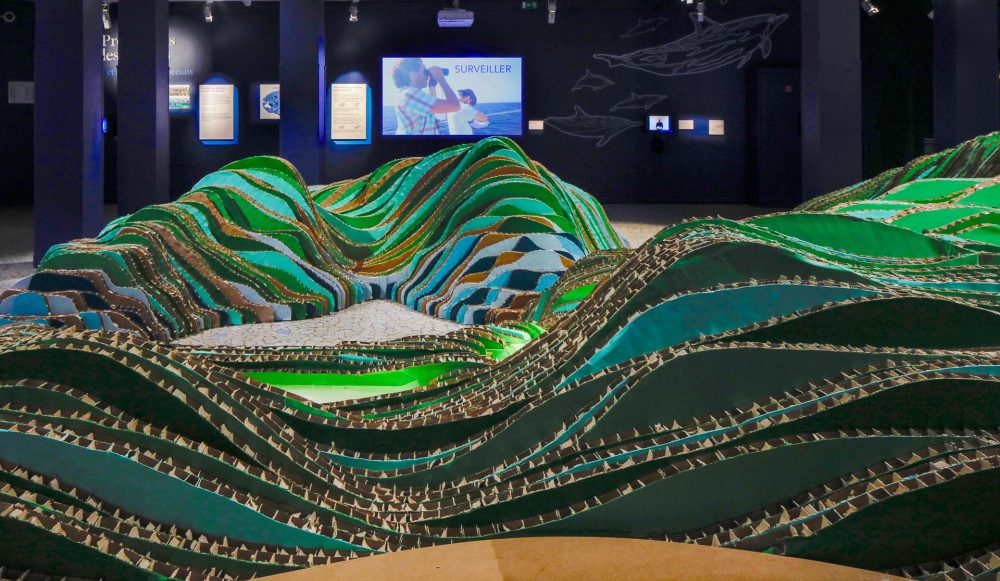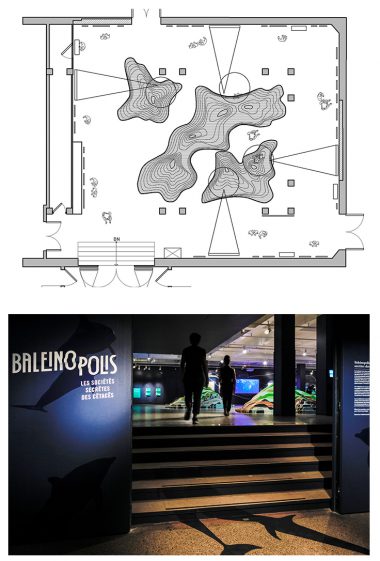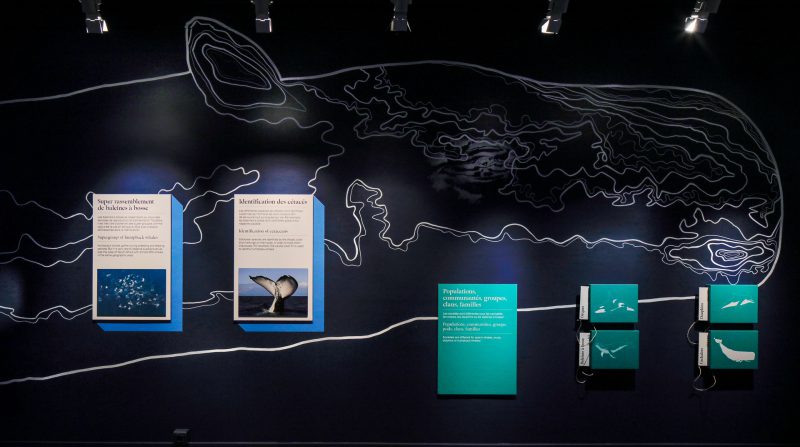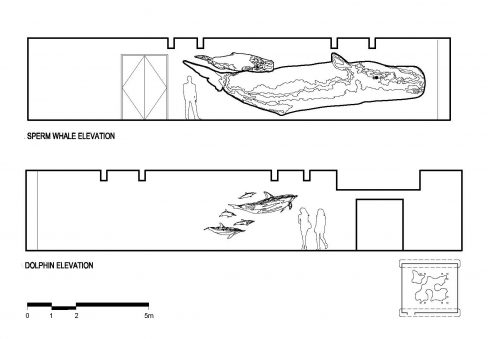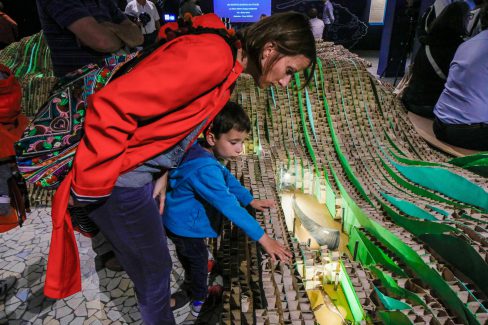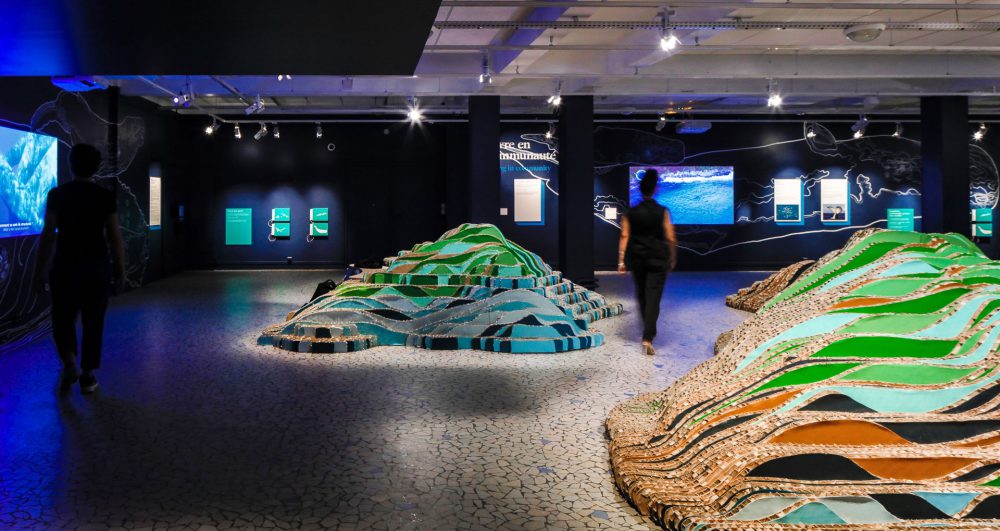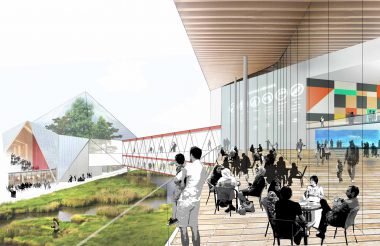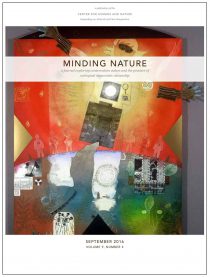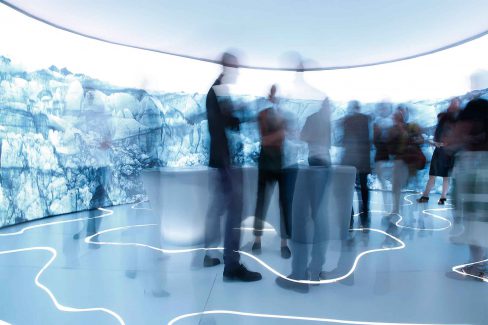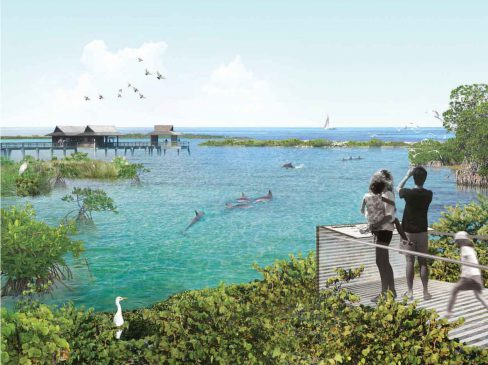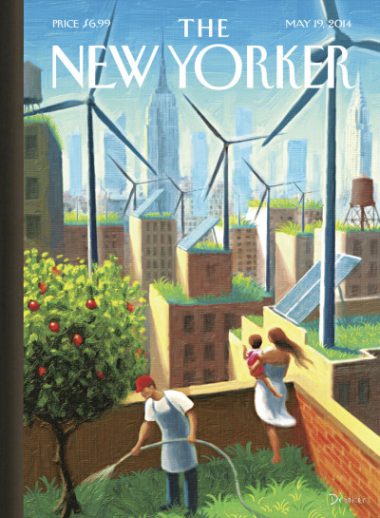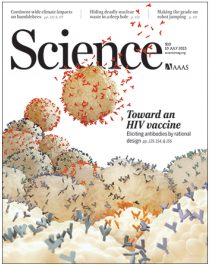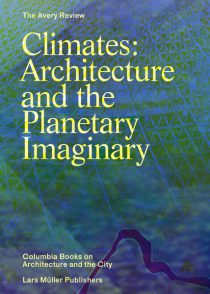Baleinopolis: The Secret Societies of Cetaceans
Location
Aquarium Tropical, Palais de la Porte-Dorée
On View
September 28, 2019 – March 13, 2020
Tags
Baleinopolis reveals the fascinating, complex social structures of cetaceans and how different species’ communities function to help them survive in the ocean. Designed by Studio Gang and developed in partnership with Olivier Adam, Professor of marine bioacoustics at the Sorbonne University, the exhibition brings together scientific and creative contributions from around the world, including the work of biologists, environmental advocates, artists, and graphic designers.
Synthesizing these contributions, the exhibition design creates an immersive space where visitors can engage with ongoing scientific research conducted over the last decade. Interactive objects and audio-visual content highlight the language, culture, and habits of four cetacean species: the humpback whale, sperm whale, killer whale, and dolphin.
Portraits of these charismatic mammals, rendered as one-to-one scale wall paintings, frame research on the societal structures of each species. Visitors learn about their unique family organizations, hunting methods, and modes of reproduction through videos from experts at the Marine Mammal Laboratory Program, Wild Dolphin Project, UNESCO, WWF, and others. Representing our human habitat, an island in the center of the room creates an acoustic environment where visitors can experience a series of cetacean soundscapes recorded by Professor Adam.
Portraits of the four species were hand-painted on the gallery walls at a one-to-one scale.
Accessible to all ages, the exhibition is designed to awaken the spirit of scientific discovery and build visitors’ awareness of contemporary issues concerning the ocean. Powerful new findings about how cetaceans are stronger when they live and work cooperatively challenge us to develop better ways of working together to protect and steward our shared earthly habitat, aquatic and terrestrial.
The central island represents the land from which humans use tools to study the four species. The topography is carved away to create space for visitors to discover artifacts from the museum’s collection or be immersed in Professor Adam’s sound recordings of whale songs.
About the Exhibition
The first exhibition at the Aquarium designed by an international architect, Baleinopolis brings together over 10 years of groundbreaking, international scientific research with hand-crafted objects and illustrations—a confluence uniquely suited to the Tropical Aquarium at the Palais de la Porte-Dorée. To underscore this connection between science and art, the main exhibition is supplemented by a program of rotating exhibitions, artistic performances, documentary screenings, and conferences.
Project Team
Olivier Adam, Curator
Nadège Gandilhon, Assistant Curator
Simon Visneux, Exhibition Video Director and Editor
CL Design, Graphic Design
Förma Productions, Fabrication
Contributors
Dr. Phillip Clapham, National Marine Mammal Lab, Cetacean Assessment and Ecology Program
Dr. François Sarano, Mauritian Marine Association Megafauna Conservation
Dr. Hal Whitehead, Dalhousie University
Sally Mizroch, Blue Sea Research
Dr. Denise Herzing, Wild Dolphin Project
April Ryan
Dr. Darren Croft, Centre for Research in Animal Behaviour, University of Exeter
Anjara Saloma, Cétamada
Stephanie Stack, Pacific Whale Foundation
Dr. Ellen Garland, Scottish Oceans Institute
Dr. Jenny Allen, Cetacean Ecology and Acoustics Laboratory, University of Queensland
Laurène Trudelle, PhD
Dr. Alex Zeribini, National Marine Mammal Laboratory
Dr. Jean-Luc Jung, University of Western Brittany
Dr. Charlotte Curé, Centre for Expertise and Engineering on Risks, Urban and Country Planning, Environment and Mobility, Acoustic Group
Dr. Yulia Ivashchenko, National Marine Mammal Laboratory
Dr. Hélène Peltier, University of La Rochelle
Awards
The Architect’s Newspaper, Best of Design Awards, Honorable Mention / Exhibition Design, 2020
Related
Jeanne Gang and Sylvia Earle: “How can zoos and aquariums foster cultures of care and conservation?”
February 19, 2016
The American Theatre
Charleston
Architect’s Newspaper — “National Aquarium in Baltimore to Build North America’s First Sanctuary for ‘Retired’ Dolphins”
The National Aquarium has announced that it will design and build North America’s first sanctuary for dolphins, “retiring” its eight Atlantic bottlenose dolphins to a protected seaside habitat by the end of 2020.
New Yorker — “The Urban Wild”
“Gang took her practice deeper into an area of long-standing interest: the relationship between nature and culture. Last year, the National Aquarium, in Baltimore, asked her to help express, through design, a signal change in its mission. It wanted to move from being an aquarium that dabbled in conservation to being a conservation organization that has an aquarium.”
